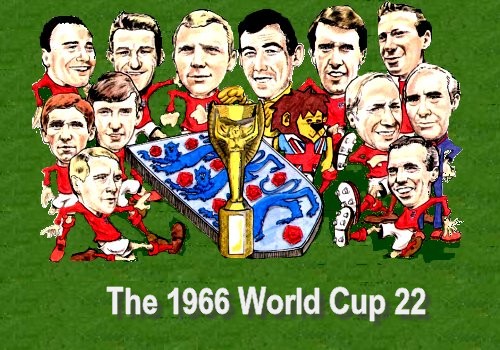 |
|
Position
|
Player
|
Career
|
| 1 |
GK |
|
Born 30 December
1937 (aged 28)
 Leicester City
Leicester City
He
joined Chesterfield in March
1953, and played for the youth
team in the 1956 FA Youth Cup
final. He made his first team
debut in November 1958, and
was sold to Leicester City for
�7,000 in July 1959. He played
in four cup finals for the
club, as they were beaten in
the 1961 and 1963 FA Cup
finals, before winning the
League Cup in 1964 and
finishing as finalists in
1965. During this time he
established himself as
England's number one
goalkeeper, and played every
game of the nation's 1966
World Cup victory. Despite
this success, he was dropped
by Leicester and sold on to
Stoke City for �50,000 in
April 1967. He made one of the
game's great saves to prevent
a Pel� goal in the 1970 World
Cup, but was absent due to
illness as England were beaten
by West Germany at the
quarter-final stage. He
was Stoke's goalkeeper in the
1972 League Cup win � the
club's only major honour. He
was still Stoke and England's
number one when a car crash in
October 1972 cost him both the
sight in one eye and his
professional career. He did
though play in the United
States for the Fort Lauderdale
Strikers in 1977 and 1978. He
briefly entered management
with Telford United, but left
the game after he was sacked
in December 1980.
|
| 2 |
DF |
|
Born 22 October 1939
(aged 26)
 Fulham
Fulham
Cohen spent his
entire playing career at
Fulham where he proved his
worth as a committed and
strong full back, especially
adept at supporting wingers
with overlapping runs.
He
joined Fulham professionally
in 1956 and remained a
dependable performer for 13
years thereafter, though his
chances at international
level seemed to be
restricted to a handful of
caps at under-23 level,
mainly due to the presence
of Blackpool's Jimmy
Armfield, who was the
regular incumbent at No. 2
and played in the 1962 World
Cup in Chile. Cohen was
awarded the MBE in 2000,
along with four team-mates
from 1966 after a campaign
from sections of the media
who were surprised that the
quintet had never been
officially recognised for
their part in England's
success.
|
| 3 |
DF |
|
Born 17 December 1934
(aged 31)
 Everton
Everton
Wilson became
an apprentice railwayman on
leaving school but was
spotted playing amateur
football by a scout at
Huddersfield Town. He began
a combination of working on
the tracks by night and
training with Huddersfield
by day, before being called
up for national service. In
1964 Wilson joined Everton,
by which time he had played
30 times for England, and
remains to this day
Huddersfield's most-capped
England international.
Wilson's fortunes declined
at Everton following another
injury, and he was granted a
free transfer to Oldham
Athletic in 1969, missing
out on Everton's First
Division title in 1970. He
retired in 1971. He
served as caretaker manager
at Bradford City from
September 1971 to November
1971 after the departure of
Jimmy Wheeler.
|
| 4 |
MF |
|
Born 18 May 1942 (aged
24)
 Manchester
United
Manchester
United
He was born
in Collyhurst,
Manchester. Stiles played for
England for five years,
winning 28 caps and scoring
1 goal. He played every
minute of England's
victorious 1966 FIFA World
Cup campaign. His best
performance in an England
shirt was probably the
semi-final of that
tournament against Portugal,
where he was given the job
of marking the prolific
Eus�bio. His tough
performance resulted in
Eus�bio being practically
nullified for the entire
game. Stiles also played
very well in the final,
which England won 4�2
against West Germany. His
post-match celebration has
become one of the most
famous images in English
sport history. The sight of
Stiles dancing on the
Wembley pitch, holding the
World Cup trophy in one hand
and his false teeth in the
other, has lived for
decades.
Stiles
played the majority of his
club career for Manchester
United, spending eleven
years at Old Trafford, where
he became renowned for his
tough tackling and ball
winning qualities. With the
Red Devils, he won two
League titles and one
European Cup. Stiles is one
of only three Englishmen,
alongside Bobby Charlton and
Ian Callaghan, to have won
both the FIFA World Cup and
European Cup. He also had short
spells with Middlesbrough
and Preston North End.
|
| 5 |
DF |
|
Born 8 May 1935 (aged
31)
 Leeds
United
Leeds
United
Born into a
footballing family in
Ashington,
Northumberland.
Approaching his 30th
birthday, he was called up
by Alf Ramsey to play for
England against Scotland at
Wembley on 10 April
1965. The game ended
2�2 despite England being
forced to end the game with
nine men after picking up
two injuries; he assisted
his brother Bobby for
England's first goal Ramsey
later said that he picked
Charlton to play alongside
Bobby Moore as he was a
conservative player able to
provide cover to the more
skilful Moore, who could get
caught out if he made a rare
mistake. He only played for
Leeds United ( 629
appearances) and England (35
Caps). Went on to
manage 1973�1977
Middlesbrough, 1977�1983
Sheffield
Wednesday, 1984
Middlesbrough (caretaker)
1984�1985
Newcastle United and
1986�1996
Republic of Ireland
|
| 6 |
DF |
|
Born 12 April 1941
(aged 25) Died 24 February
1993
 West
Ham United
West
Ham United
Robert
Frederick Chelsea "Bobby"
Moore OBE (Died 24 February
1993) .Moore was born
in Barking, Essex. He
captained West Ham United
for more than ten years and
was captain of the England
team that won the 1966 World
Cup. He is widely regarded
as one of the greatest
defenders of all time, and
was cited by Pel� as the
greatest defender that he
had ever played
against. Moore is a
member of the World Team of
the 20th Century. He won a total
of 108 caps for the England
team, which at the time of
his international retirement
in 1973 was a national
record. This record was
later broken by 125-cap
goalkeeper Peter Shilton.
Moore's total of 108 caps
continued as a record for
outfield players until 28
March 2009, when David
Beckham gained his 109th
cap. His club career was
1958�1974
West Ham United
544
Appearances, 1974�1977
Fulham
124
appearances, 1976
→ San
Antonio Thunder
24
appearances, 1978
Seattle
Sounders
7 appearances and 1978
Herning
Fremad 9
appearances. He went on to
manage at 1980
Oxford
City, 1981�1982
Eastern
AA and 1984�1986
Southend
United
|
| 7 |
MF |
|
Born 12 May 1945 (aged
21) Died 25th April 2007
 Blackpool
Blackpool
He was
the youngest member of
England's 1966 World Cup
winning team and played for
various clubs, scoring more
than 180 league goals in a
career spanning 22 years.
His playing career also
included a then national
record �220,000 transfer
from Everton to Arsenal at
the end of 1971. After
retiring as a player, he had
a 15-year career as a
manager which included
spells in the top flight of
English football with
Portsmouth, Southampton and
Manchester City.
|
| 8 |
FW |
|
Born 20 February 1940
(aged 26)
 Tottenham
Hotspur
Tottenham
Hotspur
He is
England's fourth highest
international goalscorer (44
goals), Tottenham Hotspur's
highest ever goalscorer (268
goals), the highest
goalscorer in the history of
English top-flight football
(357 goals), and has also
scored more hat-tricks (six)
for England than anyone
else. He finished as the
First Division's top scorer
in six seasons. He is a
member of the English
Football Hall of Fame.
|
| 9 |
MF |
|
Born 11 October 1937
(aged 28)
 Manchester
United
Manchester
United
He is regarded as
one of the greatest
midfielders of all time, and
an essential member of the
England team who won the
World Cup in 1966, the year
he also won the Ballon d'Or.
He played almost all of his
club football at Manchester
United, where he became
renowned for his attacking
instincts and passing
abilities from midfield and
his ferocious long-range
shot. He was also well known
for his fitness and stamina.
He was cautioned only twice
in his career; once against
Argentina in the 1966 World
Cup, and once in a league
match against Chelsea.
|
| 10 |
FW |
|
Born 8 December 1941
(aged 24)
 West
Ham United
West
Ham United
A striker, he
remains the only man to
score a hat-trick in a World
Cup final as England
recorded a 4�2 victory over
West Germany at the old
Wembley in 1966. He began
his career with West Ham
United, where he scored 242
goals in 500 first team
appearances. There he won
the FA Cup in 1964 and the
European Cup Winners' Cup
1965. He was sold to Stoke
City in 1972 for �80,000.
After three seasons with
Stoke he finished his
Football League career with
West Bromwich Albion in
1976. Hurst went to play
football in Ireland (Cork
Celtic) and the USA (Seattle
Sounders) before returning
to England to manage
non-league Telford United.
He also coached in the
England set-up before an
unsuccessful stint as
Chelsea manager from 1979 to
1981. He later coached
Kuwait SC before leaving the
game to concentrate on his
business commitments.
|
| 11 |
FW |
John Connelly
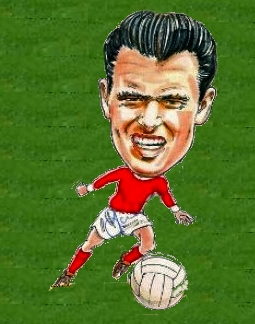
|
Born 18 July 1938 (aged
27) Died 25 October 2012
 Manchester
United
Manchester
United
He played as
an outside forward and was
capped 20 times for his
country.
Connelly made his England
international debut whilst
still a Burnley player, on
17 October 1959, against
Wales at Ninian Park. He
played twenty games for
England in all and scored
seven goals. He was a member
of the England squad that
was sent out to Chile to
take part in the 1962 FIFA
World Cup, but he was not
selected to play during
England's participation in
the tournament. Four years
later he was a member of the
England squad which won the
1966 FIFA World Cup. He
played in the opening game
against Uruguay at Wembley
Stadium, but the match was a
goalless draw and England
were disappointing. For
subsequent games Alf Ramsey,
the England manager, decided
to drop Connelly and later
do without wingers. This
proved to be his last
international game. Connelly
was one of four England
players to play for England
in the tournament without
playing in the final itself,
the others being Jimmy
Greaves, Terry Paine and Ian
Callaghan. Connelly
was presented with his medal
by Gordon Brown at a
ceremony at 10 Downing
Street on 10 June
2009.
|
| 12 |
GK |
Ron
Springett
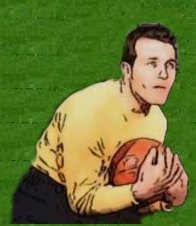
|
Born 22 July 1935 (aged
30) Died 12 September 2015
 Sheffield Wednesday
Sheffield Wednesday
He was a
football goalkeeper for
Sheffield Wednesday, QPR and
England. Springett made 33
appearances for England, all
while at Sheffield Wednesday
and until then the most
appearances by any Sheffield
Wednesday player. He held
this club record for 26
years. He made his England
debut against Northern
Ireland in 1959.[2] He had
been the first choice
goalkeeper during the 1962
World Cup in Chile. His
final cap was against Norway
in 1966 shortly before the
World Cup finals. He was a
non-playing member of the
England squad, that won the
1966 World Cup by beating
West Germany by 4 goals to
2. on 10 June 2009,
Springett was presented with
his medal by British Prime
Minister Gordon Brown at a
ceremony at 10 Downing
Street. Springett was a
member of the Sheffield
Wednesday team beaten 3-2 by
Everton in the 1966 FA Cup
Final at Wembley.
|
| 13 |
GK |
|
Born 27 September 1941
(aged 24)
 Chelsea
Chelsea
He is a former
football goalkeeper for
Chelsea, the St. Louis
Stars, Dundee United and
England. Bonetti was known
for his safe handling,
lightning reflexes and his
graceful style, for which he
was given the nickname, "The
Cat". He was one of several
goalkeepers who
specialised in a one-armed
throw which could achieve a
similar distance to a drop
kick. Bonetti's
international career was
somewhat unfortunate. He
emerged in an era of
talented English goalkeepers
and thus faced stiff
competition for a place in
the side, particularly from
Ron Springett and Gordon
Banks, and later on Peter
Shilton, which limited him
to just seven caps. He was a
member of England's
successful 1966 World Cup
squad, but didn't make an
appearance. His career with
the England national side is
also largely remembered for
one match � the 1970 FIFA
World Cup quarter-final
against West Germany in
Mexico, when he was thrust
into the starting line-up as
a late replacement for
Banks, who was suffering
from food poisoning. During
the match England let slip a
2�0 lead and lost 3�2 after
extra time, with Bonetti one
of the scapegoats, although
he could be reasonably
faulted for only one of the
three goals conceded. That
game was his only ever World
Cup appearance. He conceded
one goal in his other six
international matches.In the
1966 World Cup final only
the 11 players on the pitch
at the end of the 4�2 win
over West Germany received
medals. Bonetti was
presented with his medal by
Gordon Brown at a ceremony
at 10 Downing Street on 10
June 2009
|
| 14 |
DF |
Jimmy
Armfield
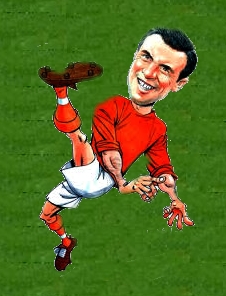
|
Born 21 September 1935
(aged 30)
 Blackpool
Blackpool
He is an English
former professional football
player and manager who
currently works as a
football pundit for BBC
Radio Five Live. He played
the whole of his Football
League career at Blackpool,
usually at right back.
Between 1954 and 1971 he
played 627 games in all
competitions, scored six
goals, and spent a decade as
the club's captain. He also
captained the England
national team fifteen times.
Armfield won 43 caps for
England between 1959 and
1966, and captained his
country on fifteen
occasions. He made his
international debut on 13
May 1959, against Brazil in
front of over 120,000 fans
at the Est�dio do Maracan�.
He played in the 1962 World
Cup in Chile, where he was
acclaimed as "the best
right-back in the
world". He was also
voted "best right-back in
Europe" between 1962 and
1964. However, a groin
injury suffered in
Blackpool's last match of
the 1963-64 season, against
Ipswich Town ruled him out
of the side for England's
busy summer program.
Fulham's George Cohen took
the opportunity to establish
himself as England's first
choice right-back with a
series of strong
performances, and Armfield
was unable to force his way
back into the team. He
played two further matches
in the warm-up to the 1966
World Cup and was included
in the winning squad but a
toe injury sustained in the
pre-tournament appearance
against Finland and Cohen's
incumbency ensured he played
no part in the tournament.
His appearance against
Finland was his last for his
country .
Armfield was presented with
his medal by Gordon Brown at
a ceremony at 10 Downing
Street on 10 June 2009.
|
| 15 |
DF |
Gerry Byrne
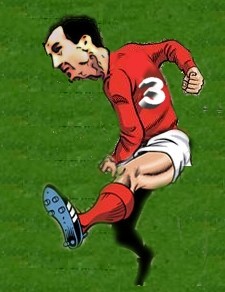
|
Born 29 August 1938
(aged 27) Died 28 November 2015
 Liverpool
Liverpool
He spent his entire
playing career at Liverpool
Football Club making 274
appearances. Byrne won two
international caps for
England. He made his
international debut on 6
April 1963, in a British
Home Championship match
against Scotland at
Wembley. The Scots won
2�1 in a game which saw
fellow Liverpool team-mate
Jimmy Melia make his England
debut. His second (and
last) cap came in a friendly
match preceding the 1966
World Cup. England won
6�1 against Norway. Byrne
stayed on at Anfield until
1969 when injury ended his
career. Byrne was presented
with his medal by Gordon
Brown at a ceremony at 10
Downing Street on 10 June
2009
|
| 16 |
MF |
|
Born 8 November 1943
(aged 22)
 West
Ham United
West
Ham United
Born in
Plaistow, Essex) he played
club football for West Ham
United, Tottenham Hotspur,
Norwich City and Sheffield
United. He briefly managed
Sheffield United before
retiring from professional
football in 1981. Alf Ramsey
had seen Peters' potential
quickly, and in May 1966 he
gave the young midfielder
his debut for England
against Yugoslavia at
Wembley. England won 2�0 and
Peters had an outstanding
debut. Nearly scoring twice
he set up chances for Jimmy
Greaves and for others. In
the final preparation period
for Ramsey prior to naming
his squad for the World Cup,
Peters played in two more of
the scheduled warm-up games.
Against Finland, he scored
his first international goal
in what was only his second
appearance, and subsequently
he made Ramsey's squad for
the competition .
Though
Peters did not play in the
opening group game against
Uruguay, the drab 0�0 draw
prompted Ramsey into
changes. The England coach
had been toying with using a
system which allowed narrow
play through the centre, not
operating with conventional
wingers but instead with
fitter, centralised players
who could show willing in
defence as well as spread
the ball and their runs in
attack. Peters therefore had
become an ideal player for
this 4�1-3-2 system, elegant
in his distribution and
strong in his forward
running, yet showing the
stamina, discipline and pace
to get back and help the
defence when required. This
system was dubbed "the
wingless
wonders". He made 67
appearances for England
though his career with his
country ended, on 18 May
1974, as England lost 2�0
defeat against Scotland at
Hampden Park
|
| 17 |
DF |
Ron
Flowers
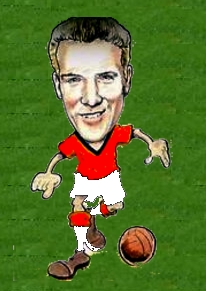
|
Born 28 July 1934 (aged
31)
 Wolverhampton Wolverhampton
Flowers won 49
caps for England and
scored 10 goals. His
international debut came
on 15 May 1955 in a 0�1
friendly defeat to France.
He went on to appear in
the 1962 World Cup and
scored two goals from the
penalty spot in the group
stage. From November 1958
(his second international
appearance) until April
1963, he appeared in 40
consecutive England
international matches;
only Billy Wright has
appeared in more. He also has the
distinction of scoring
England's first goal in a
European Football
Championships game - in
the qualifying round first
leg against France at
Hillsborough on 3 October
1962.
His
last England cap came
before the finals (a
friendly win over Norway).
He
was
the oldest and
earliest-capped member of
the 1966 World Cup Squad.
Flowers narrowly missed
out on playing in the
final itself. Jack
Charlton who was due to
play, caught a cold on the
eve of the West Germany
match. Flowers was
approached by his manager,
Alf Ramsey, the night
before the final and told
that if Charlton had not
recovered by the morning
he was on. After a
sleepless night, it turned
out that Charlton was fine
in the morning and,
ultimately, Flowers never
kicked a ball at the
tournament. Flowers was
cited as England's best
ever penalty taker (shared
with Alan Shearer). He
converted all six of the
penalties he took for
England.
|
| 18 |
DF |
Norman Hunter
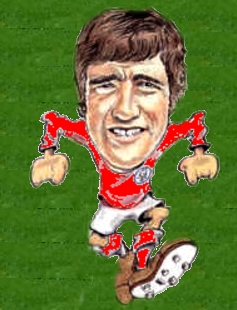
|
Born 29 October 1943
(aged 22)
 Leeds
United
Leeds
United
played for Leeds
United, Bristol City,
Barnsley and England. He was
part of the 1966 FIFA World
Cup winning squad, receiving
a winners medal in 2007. He
has since been included in
the Football League 100
Legends. Known for his
tackling, he was nicknamed
"Bites Yer Legs" Hunter. The
nickname originated from a
banner held up by Leeds
United fans at the 1972 F.A.
Cup final against Arsenal;
the banner simply read
"Norman bites yer legs".
Brian Clough effectively
popularised the nickname by
referring to it during the
pre-match discussion in the
TV studio. Hunter made his
debut for the England team
in 1965, but the existing
partnership between Jack
Charlton and Bobby Moore
meant that he spent much of
his international career as
an understudy, winning 28
caps in total. He was in the
squad which won the 1966
World Cup but never kicked a
ball. Hunter scored the
winning goal against Spain
in England's quarter-final
qualifying round for the
1968 European Championships,
he then started in both the
1�0 semi final defeat to
Yugoslavia and the 2�0
victory over the Soviet
Union in the bronze medal
match. He spent a short part
of the 1970 season injured
but he was in Alf Ramsey's
squad for the summer's World
Cup in Mexico, however his
only appearance in the
tournament was coming on as
a late substitute in the 3�2
defeat by West Germany.
|
| 19 |
FW |
Terry
Paine
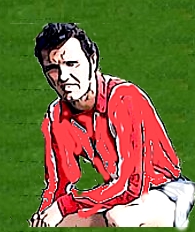
|
Born 23 March 1939
(aged 27)
 Southampton
Southampton
Originally
from Winchester, Paine is
best known for his career
with Southampton, for whom
he made over 800 appearances
(a club record) in 18
seasons with the club. He
later played for Hereford
United, and briefly worked
at Cheltenham Town as a
player-manager. He played
primarily as a winger, but
was also comfortable in
other midfield positions and
as a forward. Paine
was recognised at England
Under-23 level and scored in
an England Under-23 match
against Holland in March
1960. After 4 games with the
Under-23, in 1963 he won his
first full cap and later
that year he scored a hat
trick at Wembley against
Northern Ireland to become
the first outside-right to
score three goals for
England since Stanley
Matthews in 1937.
Furthermore, no forward
wearing the no. 7 shirt had
ever scored a hat-trick at
Wembley.
Paine featured in England
manager Alf Ramsey�s plans
and he was one of the 22-man
squad for the 1966 World
Cup. He played in only one
match, against Mexico, and
was injured in his 19th and,
as it turned out, his last
international. Ramsey, of
course, had now found little
use for �old-fashioned�
wingers. Paine was one of
four England players to play
for England in the
tournament without playing
in the final itself, the
others being Jimmy Greaves,
John Connelly and Ian
Callaghan.
Paine was presented
with his medal by Gordon
Brown at a ceremony at 10
Downing Street on 10 June
2009
|
| 20 |
MF |
Ian
Callaghan
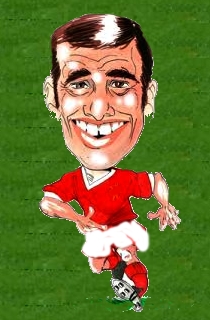
|
Born 10 April 1942
(aged 24)
 Liverpool
Liverpool
He holds the
record for most appearances
for Liverpool totalling 640
as well as 4 caps for
England. Still revered
by the Anfield faithful, he
was voted in at No.15 in the
'100 Players Who Shook The
Kop' poll in the summer of
2006. Callaghan played
in the group game against
France which England won
2�0, but ultimately was left
out of the side as it
progressed. Callaghan was
presented with his medal by
Gordon Brown at a ceremony
at 10 Downing Street on 10
June 2009. Callaghan
became one of only three
English footballers to have
a World Cup and a European
Cup winner's medal,
following Manchester
United's Bobby Charlton and
Nobby Stiles. He retired at
the age of 39 in 1982
|
| 21 |
FW |
|
Born 20 July 1938 (aged
27)
 Liverpool
Liverpool
Hunt was capped 34
times for his country, with
his debut given to him by
Walter Winterbottom whilst
he was still a Second
Division player on 4 April
1962 He then went to the
1962 World Cup finals in
Chile, but was not selected
to play. In the 1966
World Cup Finals Hunt played
in all six games, scoring
three times.
Roger
Hunt is the player whom
strike partner Hurst always
mentions when discussing his
controversial second goal in
the final when the ball hit
the crossbar and bounced
down - Hurst always says
that Hunt, the closest
player to the ball, would
have followed up to score
himself if he'd been in any
doubt, but he turned away in
celebration of a certain
goal. Back in the domestic
game, Shankly's Liverpool
team of the 1960s was
beginning to age and be
replaced, and this included
Hunt, who after 492
appearances and 245 goals
was allowed to leave on 16
December 1969 to join Bolton
Wanderers, with whom he
played 76 games and scored
24 goals. Only Ian Rush has
since surpassed his
goalscoring total for
Liverpool, though Rush
scored fewer League goals
than Hunt, who still holds
that particular Liverpool
Football Club record. He
retired from football in
1972
|
| 22 |
MF |
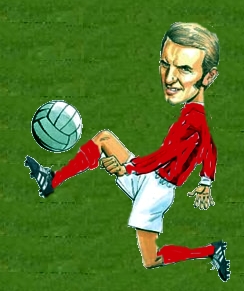
|
Born 23 September 1936
(aged 29)
 Arsenal
Arsenal
He is
known for playing for
Newcastle United, Arsenal
and Stoke City, as well as a
non-playing member of
England's 1966 World
Cup-winning squad. However,
he is also notable for his
involvement in a 1963 court
case which proved a landmark
in improving players'
freedom to move between
clubs. It was at Arsenal
that Eastham's international
career flourished; he joined
the England squad for the
1962 FIFA World Cup as an
uncapped player, but did not
play in the tournament; his
England debut finally came
on 8 May 1963, against
Brazil. His final game for
England came in a warmup
game for the 1966 FIFA World
Cup, against Denmark in
Copenhagen on 3 July 1966,
scoring in a 2�0 win.
Eastham was also part of the
squad for the 1966 World Cup
Finals, but did not play a
single minute of England's
win in the tournament.
Eastham was presented with
his medal by Gordon Brown at
a ceremony at 10 Downing
Street on 10 June 200
|
|
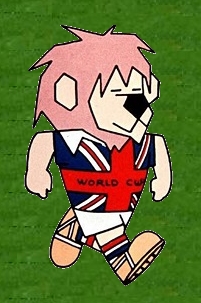 GROUP
STAGE 1 Matches GROUP
STAGE 1 Matches
| Team |
P
|
W
|
D
|
L
|
F
|
A
|
GD
|
Pts
|
| England |
3 |
2 |
1 |
0 |
4 |
0 |
+4 |
5 |
| Uruguay |
3 |
1 |
2 |
0 |
2 |
1 |
+1 |
4 |
| Mexico |
3 |
0 |
2 |
1 |
1 |
3 |
-2 |
2 |
| France |
3 |
0 |
1 |
2 |
2 |
5 |
-3 |
1 |
ENGLAND
FRUSTRATED BY CONTRACTING
DEFENCE
"...England
were...bashing their
heads against a
powerfully knit,
cleverly organized
Uruguayan defensive
wall.
"Every
English player
certainly fought and
bestirred himself to
the last breath..."
-
The Times, 12 July
1966.
|
13
July 1966
-
7:30pm
BST |
France 1
Mexico 1
[0-0]
Empire Stadium,
Wembley (69,237) |
Hausser
Borja |
|
15
July 1966
-
7:30pm
BST |
Uruguay 2
France 1
[2-1]
White City Stadium,
Shepherd's Bush (45,662) |
Rocha, Cort�s
de Bourgoing (pen) |
|
16
July 1966
- 3:00pm
BST |
Mexico 0
England 2
[0-1]
Empire Stadium,
Wembley (92,570) |
R.Charlton,
Hunt |
ENGLAND
LEAN HEAVILY ON MORALE
"If
their technique
and imagination is
limited, their
morale and fitness
are certainly at a
peak."...latent
explosive
qualities of R.
Charlton...
"For nine-tenths of the match they
attacked, bashing
their heads
against a deep
wall..."
- The Times, 18 July
1966
|
19
July 1966 - 4:30pm
BST |
Uruguay 0
Mexico 0
[0-0]
Empire Stadium,
Wembley (35,000/61,112) |
|
|
20
July 1966 - 7:30pm
BST |
France
0 England 2
[0-1]
Empire Stadium, Wembley (98,270) |
Hunt (2) |
WEST
HAM PLAYERS EXCEL AGAINST
FRANCE
"...only
side in the field that
has not yet conceded a
goal.
"...too
often were Greaves and
Hunt caught
off-side...
"...Moore...was
completely masterful,
binding the rearguard
together in its
dangerous moments, yet
finding the time to
support the fluent
Peters..." -
The Times, 21 July
1966
|
|
The Second
Phase |
|
23
July 1966 -
all
3:00pm BST |
England
1 Argentina 0
[0-0]
Empire Stadium,
Wembley (90,584) |
Hurst |
 Rattin Rattin |
West
Germany 4 Uruguay 0
[1-0]
Hillsborough,
Sheffield (40,007) |
Haller (2),
Beckenbauer, Seeler |
 Troche, Silva Troche, Silva |
Portugal 5
DPR Korea 3
[2-3]
Goodison Park,
Liverpool (40,248) |
Eus�bio (4 (2 pens)),
Jos� Augusto
Park Seung-Jin, Lee Dong-Woon, Yang Sung-Kook |
USSR 2
Hungary 1
[1-0]
Roker Park,
Sunderland (22,103) |
Chislenko, Porkujan
Bene |
TRAVESTY
OF FOOTBALL AT WEMBLEY
"...crowd
hooted and booed, cheered
and laughed in succession
as the travesty of
pushing, jostling,
chopping, holding and
tripping unwound.
"West
Ham United, united in
thought and action, had
done the trick for
England.
"...at
one moment it seemed the
whole Argentina side was
about to march off...
"If
it had not been sad, it
would have been as funny
as some Crazy Gang show."
- The Times, 25 July
1966
|
| Quarter
Finals |
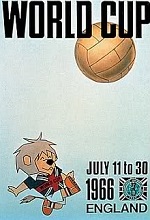 |
|
Semi
Finals |
|
25 July 1966 -
both
7:30pm BST |
Germany 2
USSR 1 [1-0]
Goodison Park,
Liverpool (38,273) |
Haller, Beckenbauer
Porkujan |
 Chislenko Chislenko |
|
26 July 1966 |
England
2 Portugal 1
[0-0]
Empire Stadium,
Wembley
(94,493) |
R.Charlton
(2)
Eus�bio (pen) |
WORLD
CUP MATCH TO SILENCE
CYNICS
"...Wembley
will remember for a
long time to come.
"...scientific,
flowing football...
"...22
minutes before the
referee blew for the
first
infringement...
"England
won by a hair's
breadth..." -
The Times, 27 July
1966 |
|
|
|
Third
Place Play off
|
|
28 July 1966 - 7:30pm
BST |
Portugal 2
USSR 1 [1-1]
Empire Stadium, Wembley (70,000/87,696) |
Eus�bio (pen),
Torres
Malafeyev |
|
|
|
|
The
1966 Final
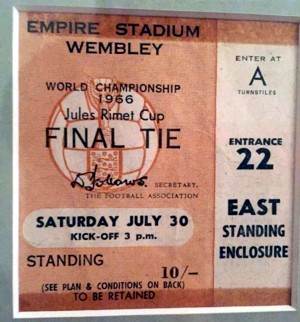
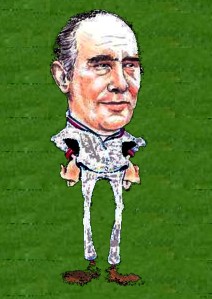
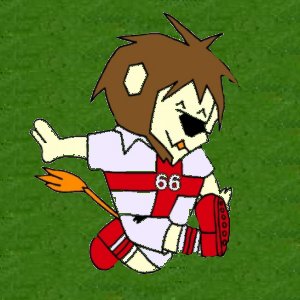
|
 |
|
|
England
have won football's
World Cup for the
first time since the
tournament began in
1930.
A crowd of 93,000
spectators -
including the Queen
and Prince Phillip -
filled London's
Wembley Stadium to
watch the host
nation play West
Germany in the final
game of the 1966
championships.
Another 400 million
people around the
world watched the
keenly fought match
on television.
In the final moments
of extra time Geoff
Hurst powered home
his third goal to
give England a 4-2
victory and to
become the first man
ever to score a
hat-trick in a World
Cup final.
After Germany had
taken an early lead,
Hurst levelled the
score for England by
half time with a
header from a free
kick taken by
captain Bobby Moore.
Victory in sight
England came out
with courage and
determination after
the break and
glimpsed glory
thirteen minutes
from time as Martin
Peters took their
second goal.
But a free kick to
Germany 15 seconds
from full time gave
Wolfgang Weber a
close-range shot
into Gordon Banks'
goal and took the
score to 2-2.
In the crucial
minutes before the
decisive half hour
of extra time
England manager Alf
Ramsey was heard to
rally his team,
saying: "All right.
You let it slip. Now
start again."
|
A
dubious goal by
Hurst - glanced off
the line by Weber
and only given after
consultation between
the Swiss referee
and Soviet linesman
- put England ahead
in the last 15
minutes, before the
striker's third goal
put the game out of
Germany's reach.
Bobby Moore went up
to the royal box to
collect the solid
gold Jules Rimet
trophy from Queen
Elizabeth.
In the largest World
Cup ever - numbering
70 countries -
England were among
the favourites and
got as far as the
semi-final, against
newcomers Portugal,
before conceding a
goal.
Geoff Hurst's
second goal and the
decision of referee
Gottfried Dienst
have continued to be
controversial.
But photographic
technology has so
far been unable to
offer decisive
evidence about
whether or not the
ball crossed the
goal-line and Hurst
remains the only
player to score a
hat-trick in the
World Cup finals.
England have failed
to reach the World
Cup final since 1966
and did not even
qualify for the last
rounds of the
tournament in the US
in 1994..
|
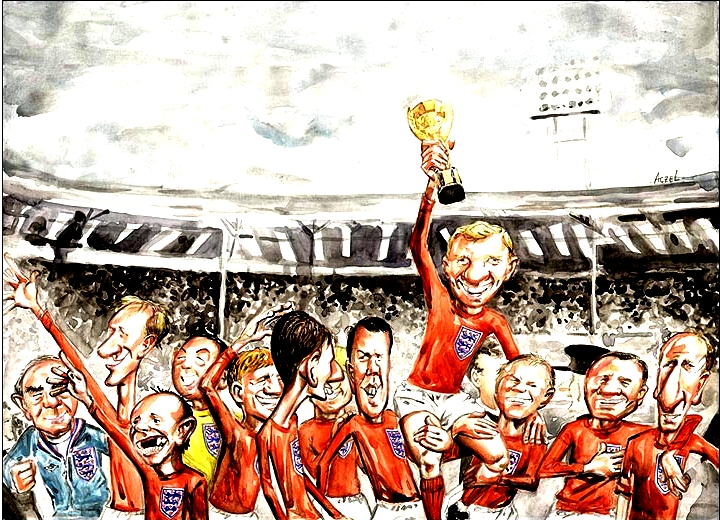 ENGLAND
SURMOUNT FINAL
TEST OF MORALE ENGLAND
SURMOUNT FINAL
TEST OF MORALE
"If England,
perhaps, did not
possess the greatest
flair, they were the
best prepared in the
field, with the best
temperament...
"...rich with
excitement and some
passing controversy
that tested the
stamina and
willpower of both
sides...
"...Moore and his
men rose
magnificently to the
challenge.
"How some of them
found the resilience
and the
stamina...was beyond
praise.
"All were heroes...
"Was it over the
line or not? It was
all a matter of
speed of eye. It
looked good." - The
Times, 1 August 1966
A
VICTORY FOR
FOOTBALL
"It
was a triumph of
skill, courage, and
stamina - and an
emphatic vindication
of the policy and
planning of the
team's manager, Mr.
Ramsey.
"...a linesman was
fortunately well
placed to see that
the ball came down
inside the goal.
"Would it, in
matches of this
standing, be worth
while to have two
extra "linesmen"
posted, say, just
behind the goals?
"Ramsey: 'We were
the fastest and the
strongest side in
the World Cup, but I
do not think we can
ever match the
individual
techniques of the
Latin-Americans or
the Latin-Europeans.
We play a different
kind of football. I
was a little worried
before the series
started that English
football was behind
the rest of the
world. But now we
have won the cup,
and it can be
inferred that we
have caught up. It
has taken English
football 100 years
to realise that
football can be
played differently
from the way it was
when it was
originated, but we
have now caught up.'
" - The Guardian, 1
August 1966
|

|
|
|
|
|
|
|